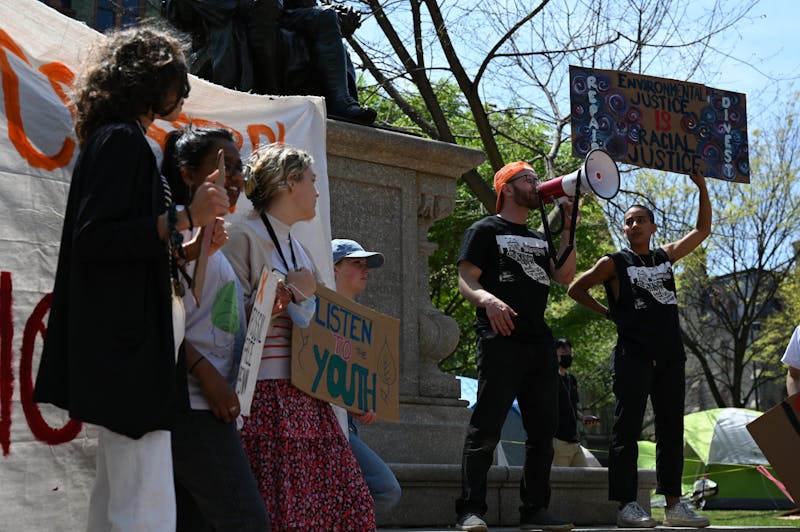
2010 College graduate Patrick Stedman was convicted and later pardoned for his involvement in the January 6, 2021 riot at the Capitol.
Credit: Jesse ZhangPatrick Stedman, the 2010 College graduate convicted and later pardoned for his involvement in the Jan. 6, 2021 riot at the Capitol, defended his actions and reflected on his time in federal prison in an interview with The Daily Pennsylvanian.
In 2023, Stedman was convicted of five offenses for his participation in the Capitol riot — including a felony conviction for obstruction of an official proceeding. He was part of a “disorderly mob” during the riot, overran police lines, and entered the chambers of then-House of Representatives Speaker Nancy Pelosi (D-Calif.), according to a press release by the United States Attorney’s Office for the District of Columbia at the time of his sentencing.
Stedman was released from custody in October 2024 after an appeals court vacated the felony conviction, and 1968 Wharton graduate Donald Trump granted him an unconditional pardon alongside 1,500 other individuals involved in the riot.
In addition to the since-vacated felony count, Stedman was convicted of four misdemeanors. He described himself as having been “under political prosecution since the very first day of Biden’s Presidency,” citing his arrest warrant being signed only three hours after the former president’s inauguration.
Stedman also praised Trump’s decision to pardon all individuals involved in the January 6, 2021 riot — including violent criminals, some of whom were convicted of assaulting police officers. He described a feeling of “relief” at having received the pardon.
“I’m glad Trump made the decision he made, first, because having heard the stories, most of these assault charges were completely bogus anyway — like holding a police shield while you got beaten — or had a context that at least made a reaction understandable, like protecting someone else from being beaten,” Stedman claimed.
He also falsely maintained that the 2020 election was “stolen” from Trump, and said that he did not regret his participation in the demonstration. Stedman also incorrectly claimed that the crowd was “provoked” into entering the Capitol.
“I do not regret standing up for the theft of the 2020 election, a fact becoming more obvious as time goes on, and that history will vindicate,” Stedman claimed. “And although I never wanted to hurt anybody, I honestly do not particularly care that some Congresspeople, who loot and pillage this country and do nothing for their constituents, became scared when our demonstration got out of control.”
Stedman also asserted that he headed in the Capitol building's direction after a speech by Trump directed attendees to “peacefully and patriotically” do so.
“I wanted Congress or Vice President Pence to delay the certification of the electoral vote, and send the votes back to the legislatures of the various swing states to review the fraud, as they were asking,” Stedman said. “I was hoping the nearly 2 million people who came down to DC — the largest demonstration in the history of the United States, in the middle of winter at that — would be enough to persuade Congress to do the right thing."
Stedman said that this plan changed “when I saw smoke and saw women and children running from the ellipse, screaming how the police had started attacking them.” He then joined what he described as a “wave of protestors climbing up the stairs of the Capitol en masse” — describing the scene as “electric” and saying that if he turned around he would have felt like a “coward.”
Stedman recollected a "rowdy" episode outside the entrance of the House, when he joined the crowd of rioters in chanting “break it down.” He conceded that it was "the one moment I genuinely reflect on with some degree of shame," but added that “it’s hard for people to understand the mood and context of that moment.”
He asserted that the police officers present “were literally standing there chilling, making no attempt to stop us, not even verbally.”
“In my state of mind I came under the impression [the police] supported what we were doing, which added to the feeling that we weren’t doing anything wrong,” Stedman said, adding that he later realized “[t]his was obviously incorrect.”
Stedman said that he left the Capitol shortly after the shooting of Ashli Babbitt, a rioter who attempted to climb through the window of a barricaded door despite receiving warnings not to do so.
Stedman, a History and Political Science major with a minor in Middle Eastern Studies at Penn, said that he considered himself a “political moderate or independent” while an undergraduate and campaigned in New Hampshire for former President Barack Obama’s 2008 campaign. He also said that he was a senior writer and editor of the Penn Political Review, business manager and president of the a cappella group Penn Six, and a member of Parliamentary Debate.
“I had a great time, and look back on my years at Penn fondly,” Stedman said.
He added that he voted for Obama a second time in 2012 — despite frequently voting for Republicans in statewide elections — but became “disaffected by both parties” by 2015. This changed when Trump — who Stedman described as an “asshole [who] spoke common sense” — ran for the presidency, and he said that he became a big supporter of his fellow Penn alumnus “early on.”
Stedman said his experience in prison "became in a lot of ways like being on college campus again," citing "gossip, partying, people cooking late at night," and "familiar faces." He added that the most enjoyable aspect of his time in prison were the interpersonal interactions, which he described as “like going back 20 years in time” and a “digital detox.” He also detailed several experiences in prison which he said he would “always cherish.”
Stedman also discussed many of the tangible harms of his year in prison and extended federal investigation, saying he is “certainly not pleased with the consequences” of his actions. He cited being banned on social media apps, negative media coverage, lost friendships, and legal fees, among other costs.
“Worst of all of course was I had to spend a year in federal prison away from my family — away from my wife and kids — all of which put an enormous burden on them in the process,” Stedman said. “It’s hard to explain the stress of having the government trying to destroy your life, and of having to ask permission to go anywhere or do anything. It’s traumatic.”
Moving forward, Stedman said that the experience taught him “just how corrupt and abusive the entire criminal justice system is,” adding that it gave him significant empathy for “those who live in the inner cities.”
“The DOJ may have been weaponized against us J6ers, but the federal criminal justice system has been weaponized to destroy the lives of minorities a lot longer than the past 4 years,” Stedman suggested, citing prosecutors’ violations of individuals’ constitutional rights, excessive sentences, poor prison conditions, and excessive sentences for drug-related crimes. He added that he wants to advocate to change the “inhumane” prison system in future years.
“I do think politics are in my future, but I’m not sure exactly how, and I’m not in a rush to make it happen,” Stedman said, while adding that his present priorities are “rebuild[ing] my life and my finances” and focusing on his vocation as a dating and relationship coach for men.
The Daily Pennsylvanian is an independent, student-run newspaper. Please consider making a donation to support the coverage that shapes the University. Your generosity ensures a future of strong journalism at Penn.
Donate











